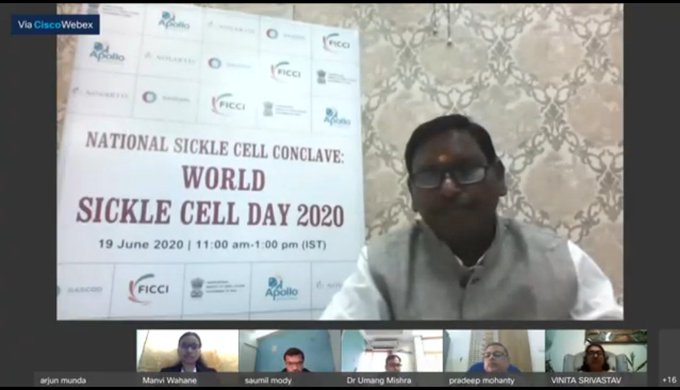Need to create more awareness in rural/ tribal areas about Sickle Cell disease and its management: Arjun Munda
New Delhi: The Minister for Tribal Affairs, Shri Arjun Munda today emphasized on the need to create more awareness about Sickle Cell disease in the county.
Addressing a webinar ‘National Sickle Cell Conclave’ to mark the World Sickle Cell Day, organized by FICCI, jointly with Ministry of Tribal Affairs, Apollo Hospitals and Novartis, Mr Munda said, “The government is committed to address and find a solution to deal with Sickle Cell disease in India.”
Mr Munda said that in order to collect real time data and provide relevant information related to Sickle Cell, the government has launched a new portal which will act as catalyst in creating awareness. “The portal will have real time data through a dashboard along with registration facility, information about the disease and various government initiatives undertaken.”
Highlighting the importance of Sickle Cell awareness, Mr Munda said, “Today, people in the rural areas are alert about COVID19 which happened due to increased awareness towards the disease. We now need to create more awareness about the Sickle Cell disease in the rural and tribal areas also. The Ministry has also initiated ‘Action Research’ project under which Yoga dependent lifestyle should be promoted and to reduce the complications in the patient suffering from this disease.”
Urging more participation from the state governments, Mr Munda said that the Ministry is looking at ways to control the disease and we will continue to take all necessary steps as required. “Sickle Cell disease not only impact the individual’s lifecycle but also impacts the economy as well,” he added.
Mr Munda said that, states should adopt more efficient measures to create a database of the patients, increase screening along with ensuring proper medical facility. “We need to ensure that the next generation should be free from this disease. There is a social stigma today in the society, we not only need to reduce this, but also find better ways to manage the disease.”
He also urged the industry and other stakeholders to come forward to improve the overall system of managing the Sickle Cell program of the government.
Dr Sangita Reddy, President, FICCI said, “FICCI is committed to provide continued support in handling of this disease. The chamber has been undertaking various endeavours to accelerate the economic development of the country with a special focus on the marginalized section of the Indian society.”
The aim of the webinar is to increase awareness in the community, the global burden of the Sickle Cell Disease (SCD) disorder and its prevalence in India. Sickle cell disease (SCD) which is the most prevalent inherited blood disorder, is widespread amongst many tribal population groups in India, posing a considerable health burden in several states. While there are several cost-effective interventions which have dramatically reduced morbidity and mortality from SCD in developed countries, the access to care for SCD in the tribal regions of India is limited.
The webinar also had a panel discussion on ‘Multiple faces of Sickle Cell Disease’ which included Dr Tulika Seth, Professor Hematology, AIIMS; Ms Vinita Srivastava, National Senior Consultant, Blood Cell, NHM, MoH&FW, GoI; Padam Shri Prof. R.N.K. Bamezai, President, GAP Health Foundation, Dehradun and Honorary Director, DSPH, IoE, Delhi University & Former Vice Chancellor, SMVDU, Katra; Ms Zakariya Ibrahim Al Kadhim, Chairman, Bahrain Sickle Cell Society; Dr PK Mohanty, HoD General Medicine & Project Coordinator, Sickle Cell Institute VSSIMSAR, Burla, Odisha; Dr Dipty Jain, Professor and HOD Pediatrics, Government Medical College, Nagpur & Advisor Global Sickle Cell Disease Network; Ms Lanre Tunji-Ajayi, CEO, Global Alliance of Sickle Cell Disease Organizations.
During the webinar The Economist Intelligence Unit (EIU) – Novartis report ‘Stepping out of the shadows – Combating Sickle Cell Disease in India’ was also released.

